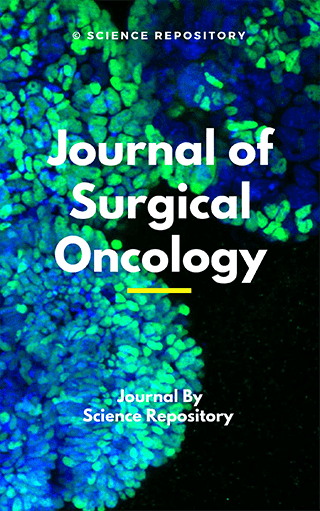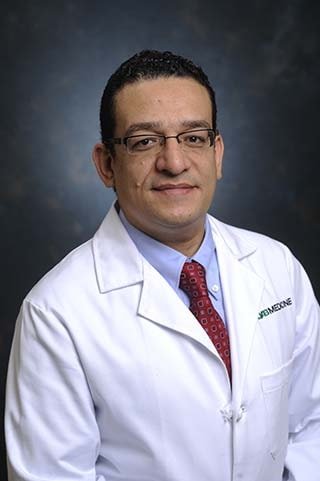Journals
- About Journal Journal of surgical Oncology (ISSN 2674-3000)
- In Press
- Editor-in-chief
- Editorial board
- Current Issue
- Submit Manuscript
- Publication Charges
- Archive
Journal of surgical Oncology (J Surg Oncol) (ISSN 2674-3000)

Aims and Scope
Journal of Surgical Oncology is open access, double-blinded peer-reviewed journal serving the International Scientific Community and encourages the participation of the chief surgeons around the world. The Journal accepts and publishes articles related to surgical oncology and its allied subjects, such as epidemiology, meta-analysis, cancer research, biomarkers, prevention, pathology, radiology, cancer treatment, clinical trials, innovative surgical techniques, multimodality treatment, and molecular biology. The journal reflects the emerging and rapidly evolving oncological research. The journal aims to highlight the spectrum of current developmental techniques on surgical oncology and its applications in diagnosis, outcomes, treatment, and prevention of the deadly disease. The journal also aims to disseminate and promote worldwide high-quality multidisciplinary patient care.
Journal of Surgical Oncology primarily focuses on the topics related to Breast Cancer Surgery, Kidney Cancer Surgery, Lung Cancer Surgery, Thyroid Cancer Surgery, Prostate Cancer Surgery, etc. JSO focuses on the most reliable sources of information on current developments as original articles, case reports, review articles, short communications, etc. and provides complete free online access to the readers and researchers worldwide.
The goal of the Journal of Surgical Oncology is to keep the readers in a row with the latest developments and improve global cancer surgery education and training that will further influence surgical oncologists’ research work. JSO supports the career development of surgical trainees and their transition into the community and academic-based practice and issues timely articles about healthcare and global research followed by policies related to the surgical patient with cancer.
All the work at Science Repository is licensed under a Creative Commons Attribution 4.0 International License. Authors at Science Repository retain copyright to their work and allow others to copy, distribute, transmit, and adapt their work, provided proper attribution is given. Electronic edition: online edition: ISSN 2674-3000
For submission authors can directly submit manuscript to submitmanuscripts@sciencerepository.org
Manuscripts number will be provided to the corresponding author within 72 hours for the respective manuscript submitted.
- 14 day review process with international peer-review standards
- Timeline of processing from Submission to Publication is 30 days
- Manuscript will be published within 7 days of acceptance
This license lets others distribute, remix, tweak, and build upon your work, even commercially, as long as they credit you for the original creation. View License Deed | View Legal Code


In Press Volume 6, Issue 1
Editor-in-chief
STÉPHANIE O. BREUKINK
Department of Surgery
Maastricht University Medical Center
Netherlands
Biography
Dr. Stephanie Breukink graduated from University Medical Center Groningen, the Netherlands. Afterwards she worked for two years as a colorectal fellow in Adelaide, Australia. She started as a colorectal consultant in 2009 at Maastricht University Medical Center, the Netherlands. In 2006, she defended her PhD: Laparoscopic TME for rectal cancer. Dr. Breukink has developed subspecialty interests in quality of life after colorectal cancer treatment and surgical management of disorders of the pelvic floor and enterocutaneous fistulae.
Editorial board
- Ahmed Kamel Abdel Aal
- Alves Arnaud
- Lian-yang Zhang
- Elizabeth N. Kuhn
- Fabio Corsi
- Giovanni Conzo
- Giovanni Scambia
- Sarno Gerardo
- Panayiotis A. Kyzas
- Leonello Tacconi
- Luca Morelli
- Lydia M. Petrovic
- Lai Meng Ow Yong
- Philip S. Mullenix
- Riccardo Casadei
- Stéphanie O. Breukink
- Francisco Sanchez Bueno
Ahmed Kamel Abdel Aal
Associate Professor
Department of Radiology
University of Alabama at Birmingham
United States
Alves Arnaud

Department of General and Digestive Surgery
Hospital Center University of Caen Normandie
France
Lian-yang Zhang

Director
Department of Trauma Surgery
Third Military Medical University
China
Elizabeth N. Kuhn

Department of Neurosurgery
University of Alabama Birmingham
United States
Fabio Corsi
Director
Istituto Clinico Scientifico Maugeri
Department of Surgery
Italy
Giovanni Conzo

Associate Professor
Università degli Studi della Campania Luigi Vanvitelli
Italy
Giovanni Scambia

Professor
Department of Gynecology
Catholic University of the Sacred Heart
Italy
Sarno Gerardo

Department of General Surgery and Kidney Transplantation
San Giovanni di Dio e Ruggi d'Aragona
Italy
Panayiotis A. Kyzas
Lecturer
University of Manchester
UK
Leonello Tacconi

Chairman
Neurosurgical Unit
Azienda Ospedaliera Integrata
Italy
Luca Morelli

Associate Professor
Department of General Surgery
University of Pisa
Italy
Lydia M. Petrovic
Keck School of Medicine
University of Southern California
USA
Lai Meng Ow Yong

Changi General Hospital
Singapore
Philip S. Mullenix

Associate Professor
Department of Surgery
Walter Reed National Military Medical Center
USA
Riccardo Casadei
Associate Professor
Department of Surgery
University of Bologna
Italy
Stéphanie O. Breukink

Department of Surgery
Maastricht University Medical Center
Netherlands
Francisco Sanchez Bueno
Professor of Surgery
University of Murcia
Spain
Current Issue Volume 5, Issue 2
Submit Manuscript
You can submit your manuscript at Science Repository. Authors submit manuscript files and metadata & can request for revision. Editors use the system to review submissions, assign to reviewers, and make and communicate decisions to accept, revise, transfer or reject manuscripts. Reviewers are invited to work on manuscripts, can accept or reject assignments.
For submission authors can directly submit manuscript to submitmanuscripts@sciencerepository.org
Manuscripts number will be provided to the corresponding author within 72 hours for the respective manuscript submitted.
- 14 day review process with international peer-review standards
- Timeline of processing from Submission to Publication is 30 days
- Manuscript will be published within 7 days of acceptance
Publication Charges
Journal of surgical Oncology is an Open Access journal and we do not charge the end user when accessing a manuscript or any article. This allows the scientific community to view, download, distribution of an article in any medium, provided that the original work is properly cited, under the term of "Creative Commons Attribution License".
In line with other open access journals we provide a flat fee submission structure on the acceptance of a peer-reviewed article which covers in part the entirety of the publication pathway (the article processing charge). The process includes our maintenance, submission and peer review systems and international editing, publication and submission to global indexing and tracking organisations and archiving to allow instant access to the whole article and associated supplementary documents. We also have to ensure enough investment to secure a sustainable model which ethically, legally and financially stable.
The publication charges for Journal of surgical Oncology are £ (GBP) 1699.
Frequently Asked Questions (FAQs)
Why do we charge?
All articles published in Science Repository are open access. Open Access publishing implies that all readers, anywhere in the world, are allowed unrestricted to full text of articles, immediately on publication in Science Repository Journals. The Article Publication Charges pay for the editorial and production costs of the journal, for hosting the website, publishing articles online, preparing HTML , PDF and XML versions of the articles and submitting the articles in electronic citation database like CrossRef.
Our financial goals are to:
- Maintain the portal for best experienece
- Recover capitalization cost
- Produce sufficient revenue to allow for a sustainable and scalable publishing program, under continuous development
- Although we charge the minimum possible but we will reduce the publication-charge cost downward over time.
When should I pay?
Corresponding author or the paying institutions should arrange for the payment once they are notified regarding acceptance of the article. APC is exempted for cases in which a wavier agreement has been made in-prior to submission.
*We request an immediate attention towards the payment as the articles will not be published unless the charges have been paid.
Who will pay the APC (Article Processing Charges)?
Corresponding author or Co-authors has to make the payment on acceptance of the article.
How do I pay?
Authors or institutions can make payments by two modes as per their convenience.
- Online Card payment
Note: No taxes are included in this charge, taxes will be applicable as per the policies of the country of the payee. Additional transaction gateway charges may be levied on the payee.
Do I have to pay if my manuscript is rejected?
No, Article processing charges will not be applicable for articles rejected by the Editorial office.
Can I be eligible for wavier on APC?
The waiver request will be considered on a case-by-case basis, and will be provided accordingly.
*The Waiver requests must be made during the submission process and will not be accepted after processing of the manuscript.
Withdrawal Charges
Please check our Refund Policy
Are reprints of my article included in the article processing charges (APCs)?
No, Article processing charges (APCs) do not include the charges for the reprints. Reprints facility is optional and should be order separately.
For more details you can refer to FAQs or contact us support@sciencerepository.org

